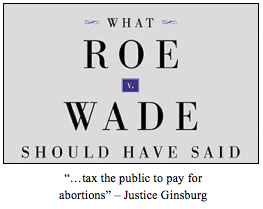By Victor Morawski
In a recent interview with the New York Times, Supreme Court Justice Ruth Bader Ginsburg unburdened herself of the revelation that she thought Medicaid funding of abortions was going to be included in the original Roe vs. Wade decision, since “there was concern about population growth and particularly growth in populations that we don’t want to have too many of.”
The emphasis is mine. The words, unfortunately, are hers. And whether one is pro-life or pro-abortion, they have a decidedly chilling effect.
Now, besides striking an unapologetic blow in favor of Eugenics – the horrifying view that selective breeding and elimination of certain segments of the population deemed undesirable will actually be good for the human race — Justice Ginsburg’s view on Medicaid funding of abortions is bizarre, even inconsistent, in a variety of ways.
In spite of her awareness that in providing Medicaid funding for abortion, government might, in her own words, “risk coercing women into having abortions when they didn’t really want them,” Justice Ginsburg over the years has been a strong advocate of such funding.
Her rather bizarre reasoning, as she said in a 1984 North Carolina Law Review Article, is that only by being able to afford to abort their children will poor women be able to stand with men in society as “independent” and “self-sustaining equal citizen[s].” In her New York Times interview she stated, “There will never be a woman of means without choice anymore…So we have a policy that affects only poor women …”
Ordinarily, those who favor less government intervention in their lives value words like “independent” and “self-sustaining” because they denote the ability of individuals to make their own, individuated decisions free of external coercion. We believe that in most matters, government should keep “hands-off” and respect our independence, our ability to make competent, responsible decisions for ourselves in matters concerning our own lives and property.
But Justice Ginsburg uses “independent” in an entirely different way, with entirely different implications for government involvement. For her, giving poor women independence in their reproductive choices means making them dependent upon government funding to exercise their prerogatives – in short, forcing others (i.e., taxpayers) to foot the bill for the indigent’s “independent” decision.
In other words, according to Ginsberg, government should force taxpayers to economically empower poor women to choose to have an abortion – just as it now forces taxpayers to pay for poor women’s (increasingly illegitimate) live births.
She even takes it a step further. According to the venerable jurist, “government has no business making that choice [the choice for childbirth] for a woman.” And by funding only one side, it is effectively doing just that. So in her rather circumscribed reasoning on this issue, the only way government can stay out of the poor woman’s decision is by funding either choice she makes — childbirth or abortion.
Apparently, the very idea that, perhaps, government could stay out of the poor woman’s decision by funding neither never crosses the myopic mind of the liberal jurist. Unfortunately, the idea that abortion can be used to control population growth “in populations that we don’t want to have too many of” does. And for that reason, we can all be thankful that Ms. Ginsberg’s days on the bench may soon be coming to a close.
Victor Morawski is an ALG News contributing writer and a professor of philosophy at Coppin State University.


